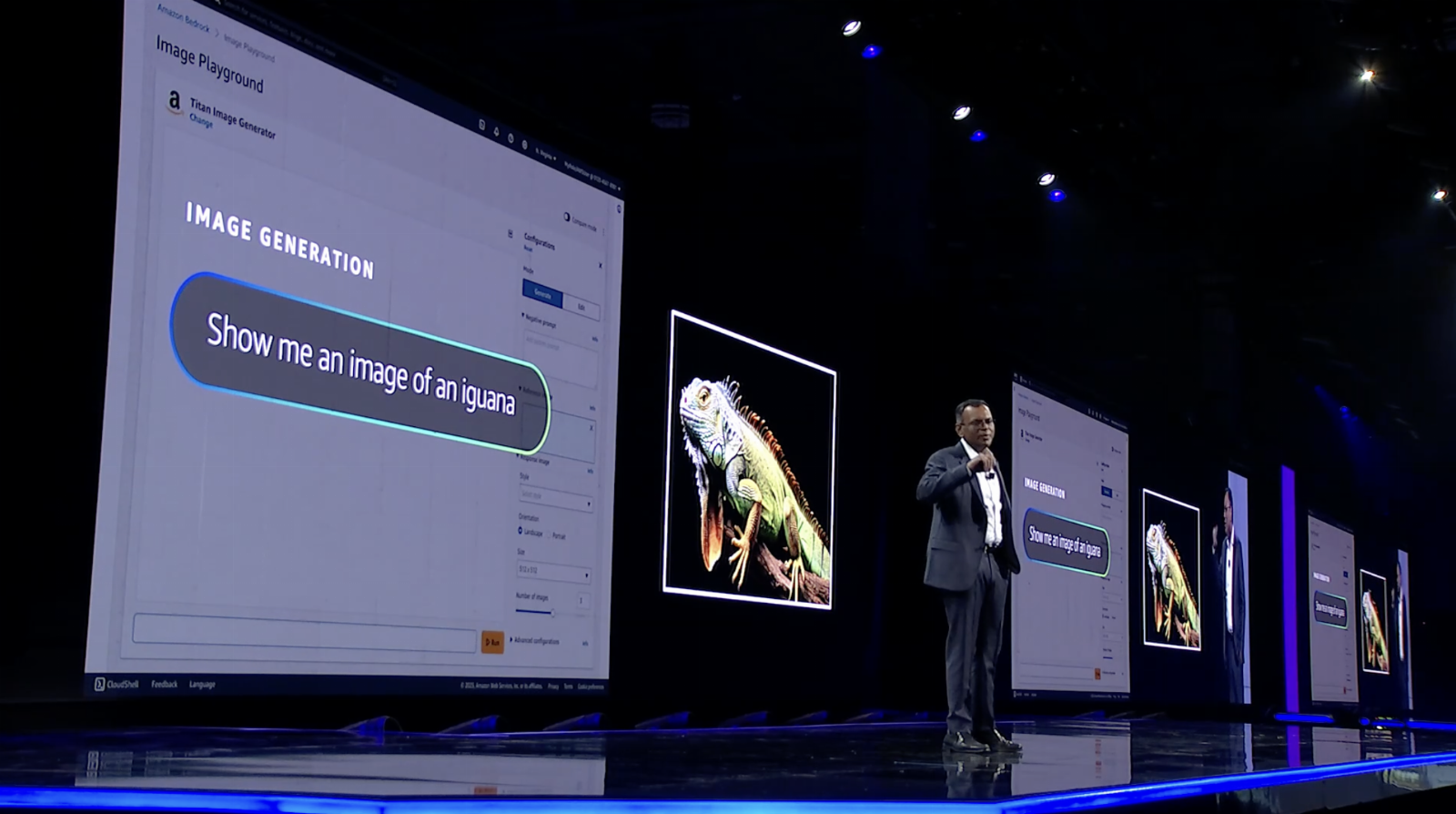
Amazon finally releases its own AI-powered image generator
Reading Time: 3 minutesAmazon is releasing an image generator — joining the ranks of the many, many other tech giants and startups that have already done so.
During a keynote at its re:Invent conference this morning, Amazon debuted Titan Image Generator, which is now available in preview for AWS customers on Bedrock, Amazon’s AI development platform. A part of Amazon’s Titan family of generative AI models, Titan Image Generator can create new images (given a text description) or customize existing images.
‘[You] can use the model to easily swap out an existing [image] background to a background of a rainforest [for example],’ Swami Sivasubramanian, VP for data and machine learning services at AWS, said onstage. ‘[And you] can use the model to seamlessly swap out backgrounds to generate lifestyle images, all while retaining the main subject of the image and to create a few more options.’
Amazon says that Titan Image Generator was trained on a ‘diverse set of datasets’ across a ‘broad range of domains’ and can be optionally fine-tuned on custom datasets, and includes built-in mitigations for toxicity and bias. (Barring testing, the jury’s out on just how effective those mitigations are, of course.) The company declined to say exactly where those datasets came from however — and whether it obtained permission from or is compensating all the creators of the images used to train Titan Image Generator.
Some companies developing image generators, like Stability AI and — as of a few months ago — OpenAI, allow creators to opt out of training datasets if they so choose. Others, including Adobe and Getty Images, are establishing compensation schemes for creators — albeit not always well-paying or transparent ones.
Sivasubramanian did claim onstage, however, that Amazon will protect customers accused of violating copyright with images generated by Titan Image Generator — in keeping with its AI indemnification policy. That’s surely music to the ears of AWS customers worried about regurgitation, or when a generative model spits out a mirror copy of a training example.
In a recent survey of Fortune 500 companies by Acrolinx, nearly a third said that intellectual property was their biggest concern about the use of generative AI. Another poll found that nine out of 10 developers ‘heavily consider’ IP protection when making decisions on whether to use generative AI.
‘We’re carefully choosing how we train our models and the data we use to do so,’ he said. ‘With these investments, our customers will have the flexibility to select the best models for their requirements even as their needs grow and change.’
Images created with Titan Image Generator will also come with a ‘tamper-resistant’ invisible watermark by default — an attempt to mitigate the spread of AI-generated misinformation and abuse imagery, Sivasubramanian says. (Deepfakes from the Gaza war and AI-generated child abuse images are the latest illustrations of how major the threat’s become.) It’s not clear exactly what sort of watermarking technique Amazon’s using and which tools beyond Amazon’s own API will be able to detect it; we’ve reached out to Amazon for clarification.
Sivasubramanian noted watermarks are a part of the voluntary commitment around AI that Amazon signed with the White House in July. Other signatories, among them Google and Microsoft, have adopted the Content Credentials system developed by the Coalition for Content Provenance and Authenticity or developed their own solutions.
Ref: techcrunch
MediaDownloader.net -> Free Online Video Downloader, Download Any Video From YouTube, VK, Vimeo, Twitter, Twitch, Tumblr, Tiktok, Telegram, TED, Streamable, Soundcloud, Snapchat, Share, Rumble, Reddit, PuhuTV, Pinterest, Periscope, Ok.ru, MxTakatak, Mixcloud, Mashable, LinkedIn, Likee, Kwai, Izlesene, Instagram, Imgur, IMDB, Ifunny, Gaana, Flickr, Febspot, Facebook, ESPN, Douyin, Dailymotion, Buzzfeed, BluTV, Blogger, Bitchute, Bilibili, Bandcamp, Akıllı, 9GAG